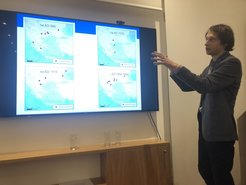Paleo-Science & History Outreach Activities: spreading innovative methods for the collaboration of science and history
The Paleo-Science & History (PS&H) group focuses on developing new ways of combining the natural scientific and humanities-driven approaches to the study of the premodern times, from Antiquity until the dawn of the industrial era (18th/19th c.). Group members include historians, biologists and geologists, and together they study written documents and natural archives (caves, lakes, peats, etc.) that contain information about human interaction with the environment in the past. Many of the methods are completely new to the field of historical studies, as are the mathematical and theoretical tools that allow for their integration. Because of that, the group pays special attention not only to regular publication of its results and conference presentations, but also to sharing methodology and approaches with early-career colleagues. They hope that in this way the group contributes to the long-term transformation of the field of history and the emergence of a self-standing field of “science and history.”

The first workshop the group organised took place in Athens in late March 2019, and was co-organised with Princeton University’s Hellenic Studies Programme and the Climate Change and History Research Initiative, in which the PS&H group leader Adam Izdebski has been involved for several years as one of the steering members. The workshop lasted two days and focused on introducing an international group of Athens-based historians and archaeologists to the natural scientific fields dealing with the past, such as palynology, paleoclimatology, or bioarcheology. Group members also presented their work as case studies showing how the application of the natural scientific methods, combined with more traditional historical analysis, transforms our understanding of the past. Apart from the members of the group, presenters included several other scholars from Germany, Israel, the USA and Greece.
In July 2019, in collaboration with the Chair of Byzantine Studies at the Free University of Berlin, Prof. Johannes Niehoff-Panagiotidis, the PS&H group member Dr. Georgios Liakopoulos taught a one-week summer course in early Ottoman palaeography and textual analysis to students from all around Europe. The study of early modern – in particular, Ottoman – archival documents and their inclusion into a specially designed database is at the core of the research activities of the PS&H group. In this way, the historians on the team create a quantitative dataset based on historical documents that could be later combined with the natural scientific (paleoenvironmental) data into a single analysis. The course proved to be immensely popular and the number of participants – most of whom came to Berlin just for this course – was more than 30.

The September 2019 workshop took place in Białystok, in north-eastern Poland, at the leading centre for the study of economic history in the country. The PS&H group has had a long-standing collaboration with this pioneering centre, which has led to a number of joint publications. The aim of the workshop – designed for PhD students in history – was to introduce them to environmental history, scientific methods of landscape reconstruction as well as quantitative approaches to human history. The PS&H group leader, Dr Adam Izdebski, gave a one-day seminar on science and history, based on publications of the members of different departments of the MPI SHH, and a single-lecture crash-course in North American environmental history.
Outreach activities aimed at early-career colleagues are at the heart of the research programme carried out by the PS&H Independent Research Group. The group hopes to contribute to the transformation of the discipline of history, an aim that can only be achieved if historians – especially those at the beginning of their career – acquire a deeper understanding of the natural scientific approaches to the study of the past and learn how to combine them with their everyday study of textual sources. Consequently, the PS&H group hopes to continue the outreach activities in 2020, and is already planning a number of collaborative workshops in Germany and across Europe.

